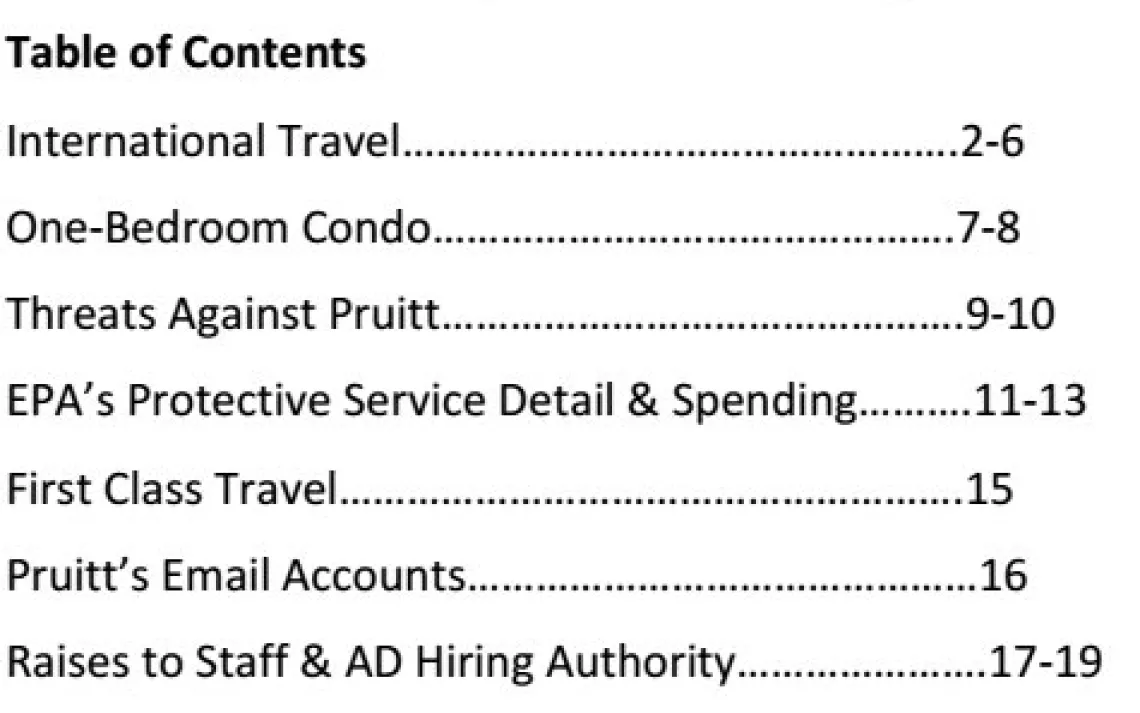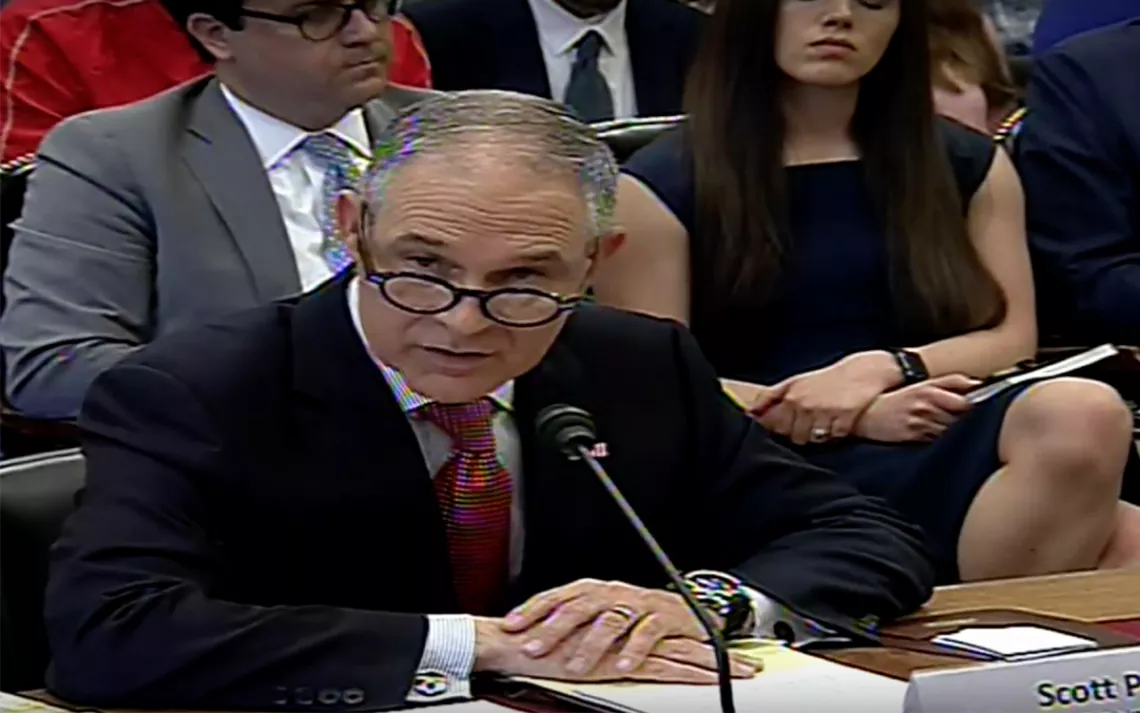Who Else Is Fed Up With Pruitt? Congress.
We watched six hours of EPA budget talks so you didn't have to
“This is not dodge-question day,” Representative Anna Eshoo (D-Calif.) told Scott Pruitt about an hour in to what turned out to be six hours of questioning by two congressional committees on Thursday. But it was dodge-question day, because, for the embattled EPA administrator, every day is dodge-question day. While Pruitt's prepared statements before the hearings stuck to budget and policy, the EPA sent some lawmakers a 23-page document defending the multitudinous ethical infractions that Pruitt has been accused of, complete with a helpful table of contents.

Pruitt’s testimony followed tactics familiar to anyone who has seen him being grilled in the past—he talked very fast, said very little, and, when cornered, blamed everything on nameless EPA staffers. Among these were the “career employees” who liked nothing more than buying him things and finding covert ways to give substantial raises to the staffers referred to as Pruitt’s “Oklahoma Posse.” There was also the EPA’s Office of General Counsel, which allegedly told him that spending $43,000 of taxpayer money for a soundproof phone booth straight out of a James Bond movie was totally legal. Also shouldering the blame was the EPA’s inspector general, who so feared for Pruitt’s life that he approved unprecedented security expenditures.
The two-part nature of the hearings gave representatives at the second hearing the chance to follow up on Pruitt’s earlier statements. Officially, the hearings were about the EPA's fiscal year 2019 budget request. The first was before the House Energy and Commerce subcommittee, at 11 A.M., and the second was before the Appropriations Committee subcommittee at 2 P.M. We watched all six hours. Here are some highlights.
We all receive death threats on our Facebook page.
At the second hearing, Representative Betty McCollum (D-Minn.) informed Pruitt that she’d reached out to the EPA’s inspector general, Arthur Elkins, and that Elkins reported that he had definitely not deemed Pruitt’s life to be in such unprecedented danger that Pruitt required a full security detail on vacation to Disneyland. “Please explain yourself,” said McCollum.
“I am looking at the inspector general’s report right now,” said Pruitt.
“Who is it issued by? Elkins?”
“It just says inspector general,” said Pruitt, looking down at a stack of papers. “Death threats were made on a Facebook account. A second one was a Tweet. Those are just two examples.”
“Can I see the letter, please?” asked McCollum, crisply. “We all receive death threats on our Facebook page.”
With all due respect: CAFE standards
“It is widely reported you do not agree with the issues of climate change,” said Chellie Pingree (D-Maine). But the Gulf of Maine is warming 99 percent faster than other oceans around the world. My grandfather is a second-generation fisherman, a tradition I would like to carry on. Our lobster fishermen will be replaced by tourists. If you aren’t going to listen to scientists, who are you going to listen to?”
“I agree that the climate is warming and we are contributing,” said Pruitt. “What authority does the EPA have to do about it?”
“With all due respect,” said Pingree, disbelievingly, “CAFE [Corporate Average Fuel Economy] standards.”
“There were two efforts made by the previous administration to regulate CO2, and both of them were struck down by the courts” said Pruitt.
“CAFE standards were not struck down by the courts,” said Pingree.
“The Clean Power Plan was,” said Pruitt. [Note: The Supreme Court didn’t strike down the Clean Power Plan, just stayed its implementation and kicked it over to the lower D.C. Circuit Court of Appeals.] Plus, said Pruitt, "emissions are going down anyway."
“That was not your doing,” said Pingree. “I just want to be clear: I find those statements unacceptable.”
The real story behind the soundproof booth
Pruitt told Tony Cárdenas (D-Calif.) that one day he got a phone call “of a sensitive nature” and didn’t feel comfortable just taking it in his office. “I gave direction to my staff to address that,” Pruitt said. The next thing he knew, he had a $43,000 soundproof phone booth, even though any office purchase over $5,000 needed congressional approval.
“If I’d known about it, congressman, I would have refused,” said Pruitt.
“If something happens in my office,” replied Cárdenas, “especially to the degree of $43,000, I know about it before, during, and after.”
Which is more important to you: the happiness of the businesses you regulate or the happiness and life of Americans?
Representative McCollum wasn’t the only person to bring up methylene chloride, an ingredient that the EU banned from paint strippers in 2011, but she was the best at interrogating Pruitt about it. When used in areas without much ventilation, it causes otherwise healthy people to pass out and stop breathing.
“You indefinitely postponed a rule to ban strippers containing methylene chloride,” said McCollum. “Just this past October, Drew Wynne was overwhelmed with fumes while renovating the floor of his business. Which is more important to you: the happiness of the businesses you regulate or the happiness and life of Americans?”
“The Obama administration proposed that ban,” said Pruitt. “There will be a decision on the ban, but there hasn’t been a decision yet.”
“Perhaps you can tell us how long that process will take,” said McCollum. “Lives are being lost.”
“It kind of depends on the volume of comments,” said Pruitt. “I think we could do it this year.”
Even Justice Scalia
“I worked in economic development,” said Derek Kilmer (D-Wash.). “When you do brownfield restoration, when you clean up Puget Sound, it’s good for business. Tacoma is a more vibrant city because we remediated lands and waters. But the P in EPA doesn’t stand for 'profit' or 'personal gain'; it stands for 'protection.' I invite you to visit our region. We are seeing the impacts of climate change firsthand. Come visit our coastal communities. I represent 11 Native American tribes. Four of them are coastal tribes in process of trying to move to higher ground. The folks in my neck of the woods depend on EPA to be their first line of defense, and you’ve let them down. You said, 'I think there's assumptions made that because the climate is warming that is not necessarily a bad thing. We know that humans have most flourished during these times of warming trends.' What would you say to our coastal communities? Do you really think they’re going to flourish because of this?”
“We are looking at those options,” said Pruitt. “On what steps we can take to regulate CO2.”
“You question that you have the legal authority to do that?” asked Kilmer. “Even Justice Scalia held that opinion that you do.”
Even Republicans want their EPA rules.
Some representatives—notably Evan Jenkins (R-W.Va) fawned over Pruitt. “What a difference a few years makes,” said Jenkins. “I remember Gina McCarthy sitting where you are right now, just a few feet away from me.”
But others spoke up for environmental policies in their states, like Mike Simpson (R-Idaho), who wanted to know what Pruitt could do for his state’s dropping aquifers (a lot, Pruitt replied vaguely), if the EPA could maintain funding for state and tribal assistance grants. “They’re very important for clean water,” said Simpson. “One of our most important projects was zeroed out in this budget. It was also zeroed out last year—the Rural Water Assistance Program. A lot of people in rural Idaho depend on this. Is it wise to do this?”
Ken Calvert (R-Calif.) pressured Pruitt to answer yes or no as to whether the EPA planned to continue the Clean Air Waiver, which allows California to set higher energy efficiency and emissions standards for products and vehicles sold within the state. “Reagan was very much involved in maintaining this waiver,” Calvert said, hoping to sweeten the deal. Pruitt refused to give a definitive answer, saying only that he was working “very diligently to try to achieve commonality.”
Tom Cole (R-Okla.) complained to Pruitt that California’s waiver was affecting an Oklahoma-based air conditioning manufacturer. "It’s clear all states are equal under the constitution but not all equal in how they can affect the market,” said Cole bitterly.
“It’s important for us to regulate our own air,” Calvert shot back.
I will drive you there myself.
Marcy Kapur (D-Ohio) wore a lime-green suit as she addressed Pruitt. “I wore this color for a reason,” Kapur said. “Last year I invited you to come to Lake Erie." Lake Erie is very shallow, Kapur continued. Phosphorus and manure runoff left it overcome with toxic algal blooms, hence the algal-bloom-colored ensemble.
"I was a little offended you did not come out to visit us," said Kapur. "I know you're a busy man. But I read in the paper that you in the past year traveled to Italy and Morocco, and the trip to Italy alone cost more than $120,000. Do you have any idea what a plane ticket to Cleveland, Ohio, might cost you?”
“Less than a trip to Italy?” asked Pruitt.
“A great deal less. About $250,” said Kapur. “The president's budget for this year recommended elimination—zeroing out—of the Great Lakes Restoration Initiative. Did you recommend that to the president?”
“I did not.”
The new EPA budget cuts the Great Lakes Initiative by 90 percent, Kapur continued, which is $270 million. “Our states depend on this funding. Did you recommend to the president that he cut those programs?”
“I did not.”
"The Region 5 Superfund office is understaffed," Kapur said. "Region 5 lost at least 90 employees, and the EPA has hired only two to replace them. It has zero hydrogeologists and zero civil investigators to look into who is polluting the Great Lakes, which means that there aren’t the resources to sue companies that pollute, which means that Superfund is also underfunded."
“The good news,” said Pruitt, “is that the OMB [the EPA's Office of Management and Budget] has actually lifted the hiring freeze for Region 5.”
“So what are you going to do for Region 5?” asked Kapur. “This is what it looks like. [She paused to wave her jacket collar in Pruitt’s direction.] I invite you out here this year. I will drive you myself, if you don't like airplanes."
“For us, this is a life-or-death issue. And I just don't see that EPA is serious. . . . To have this kind of ignorance by the EPA, I consider at this point to be un-American,” Kapur continued. “I expect more than cursory answers to this committee. I look forward to your letter of reply.”
 The Magazine of The Sierra Club
The Magazine of The Sierra Club




